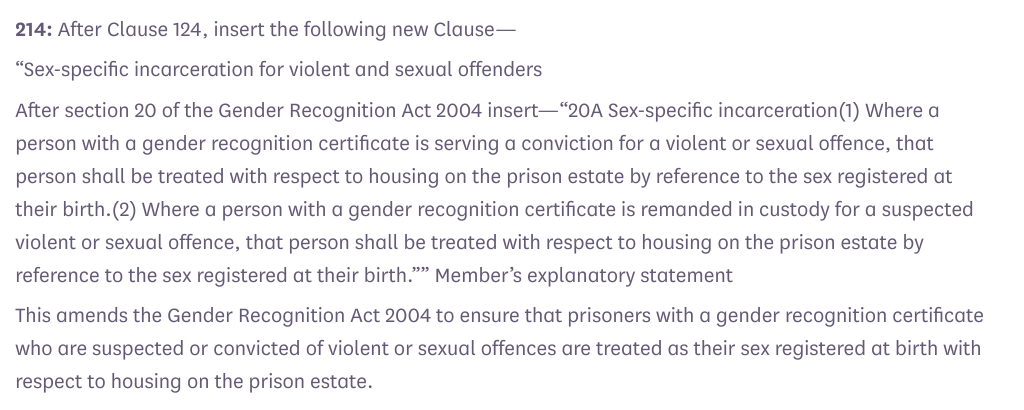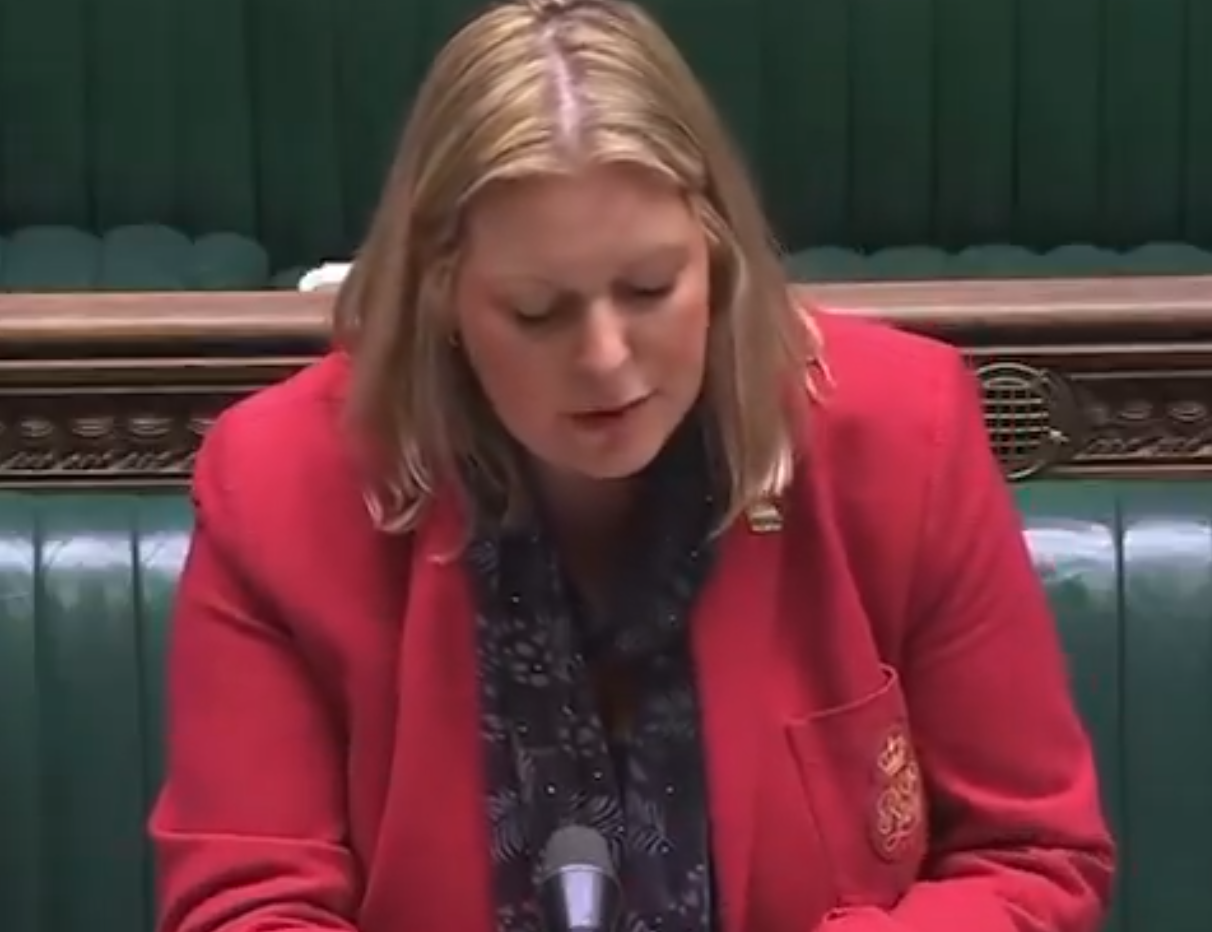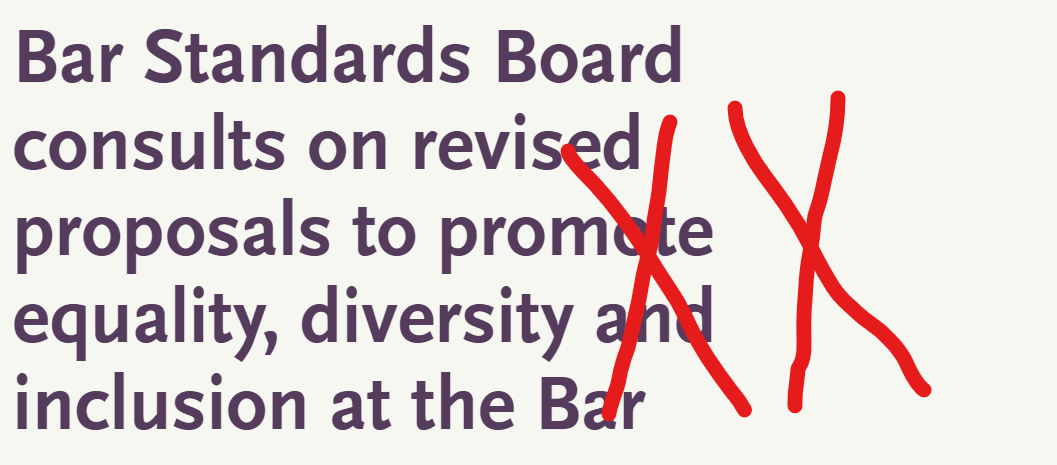The era of no debate has ended - let the talking begin!

Written by Caroline ffiske, Published 16 November 2021
Recently I challenged a Conservative MP to defend the Ministry of Justice's prison's policy which allows trans-identifying male prisoners to be housed in women's prisons.
His response? Such a policy has never seen the light of day in a Conservative Manifesto... Such a policy has never been debated in the House of Commons... Such a policy has never been subject to a democratic vote... In effect, it has never been subjected to democratic scrutiny...
In a nutshell: over the issue of whether trans-identifying males should be placed in women's prisons, there has been no debate... Lord Blencathra puts it pithily: 'It is a policy invented by officials that past Ministers have signed off on.'
Well, now, those days are over. Last night, in the House of Lords, Lord Blencathra moved an amendment to the Police, Crime, Sentencing and Courts Bill. If adopted, it would provide that 'prisoners with a gender recognition certificate who are suspected or convicted of violent or sexual offences are treated as their sex registered at birth with respect to housing on the prison estate'.
And a debate ensued... The era of no debate is over. Democratic scrutiny has arrived. We must all make sure it is here to stay.
While the whole debate can be found here, we present below, the response to the amendment from The Parliamentary Under-Secretary of State, Ministry of Justice, Lord Wolfson of Tredegar, and the closing words from Lord Blencathra. While the amendment was withdrawn (to enable debate!) Lord Wolfson has invited interested Lords to "a teach-in from officials, who will be able to provide noble Lords with information and explain how it works. I have been able to check and they would be very happy to do that. We will arrange that in the normal way".
The wording slightly implies a one-way street. Sorry bureaucrats - never again. Thank you noble Lords.
***
The Parliamentary Under-Secretary of State, Ministry of Justice (Lord Wolfson of Tredegar) (Con)
My Lords, having heard the noble Lord, Lord Paddick, perhaps I can begin with two confessions. First, I frequently listen to and discuss issues with people with whom I firmly disagree including, on occasion, Members of your Lordships’ House. Secondly, I do not propose to change that approach.
This amendment from the noble Lord, Lord Blencathra, relates to the management of prisoners who have changed their legal gender by obtaining a GRC—a gender recognition certificate. The effect of the amendment would be that a prisoner with a GRC who is convicted of or on remand for a violent or sexual offence would be, and would have to be, held in a prison matching their sex at birth. I assure the noble Lord, Lord Hunt of Kings Heath, that I and the MoJ take this issue very seriously but, and with no disrespect to any noble Lord whose speech has ranged more widely, we are in Committee on this Bill. I shall confine my remarks to the subject matter of the amendment rather than the broader questions, whether on Stonewall or related topics, interesting and thought-provoking though they were. The Committee will be aware that the MoJ left the Stonewall diversity scheme in June this year, but I reiterate the department’s commitment to diversity in all its diverse forms. Our policy is not driven by ideology; it is driven by compliance with the law of the land and to consider protection for all—I repeat all—the prisoners in our care.
Reference has been made to the 39-page policy. Let me just read what the section under “Outcomes” says:
“The high-level outcomes of the new Policy Framework are intended to strike an appropriate balance, ensuring” first that: “All transgender individuals are managed safely with their rights properly respected and in accordance with the law” and, secondly: “Decisions are informed by all available evidence and intelligence in order to achieve an outcome that balances risks and promotes the safety of all individuals in custodial settings and approved premises. This includes an assessment of risks presented to and by transgender individuals.”
The Committee will have noted the two references to balance in that section, as pointed out by the noble Baroness, Lady Falkner of Margravine. As the noble and learned Baroness, Lady Butler-Sloss, pointed out, two groups—perhaps at least two, I would say—need respect and understanding in prison. I suggest to the Committee that that policy is correct in law and, I believe, in principle too. With all due deference to my noble friend Lord Cormack, I suggest that it is morally correct as well.
This is about legality, safety and dignity, so in answer to the point put to the Committee by the noble Baroness, Lady Fox of Buckley, no: the world has not gone mad and it is a gross mischaracterisation of government policy to suggest that I or the Government have “no qualms” about letting rapists share living quarters with women. I assume that point was put because the noble Baroness does not understand what the policy is, so let me explain the actual policy to her and to the Committee.
The policy is that transgender prisoners are allocated to a prison matching their legal gender but can be held in a prison opposite to their legal gender where they would otherwise present an unmanageable level of risk to other prisoners. The current policy therefore allows for prisoners with GRCs to be held in a prison matching their sex at birth, where that is appropriate. I can therefore confirm, because I have had this checked, that contrary to the position set out by the noble Lord, Lord Blencathra, there are trans women with GRCs who are now housed in the male estate following the risk assessment process.
The critical point, as pointed out first, I think, by the noble Lord, Lord Pannick, and then adopted by others, is that that policy differs from that suggested by the amendment because the current policy is not a blanket approach. The amendment is a one-size-fits-all approach, or a blunt instrument, as I think the noble Baroness, Lady Chakrabarti, put it. We manage prisoners with GRCs on a case-by-case basis. That is absolutely right, because we want to make sure that there are no assaults in any prison by any prisoner on any other prisoner or, of course, on a member of staff.
The amendment would end the balanced approach. It would mean that a prisoner with a GRC would never be held in the part of the prison estate that matched their acquired gender, even though in some cases this would pose a manageable level of risk and would, on balance, be the safest and most appropriate course of action. It would lead to a prisoner with a GRC having to be kept in a prison that matched their sex at birth, even when that posed an unmanageable level of risk, which would be an utterly bizarre conclusion. It would mean, for example, that a prisoner who had transitioned from female to male and had obtained a GRC would be kept in a women’s prison, even if that posed an unmanageable level of risk to the women they were in prison with. We are very conscious, as my noble friend Lady Meyer pointed out, that women in prison are especially vulnerable. This amendment, I am sure unintentionally, might expose them to greater danger.
It is simply not possible to argue that holding transgender prisoners with GRCs in a prison matching their sex at birth is always necessary and proportionate in every instance. By far the better policy is the policy we adopt, which is to look at matters on a case-by-case basis. I also point out that the amendment applies only to prisoners with GRCs, which most transgender prisoners do not have.
Before I sit down, I will pick up two further points—first, the point from my noble friend Lady Meyer on Amendment 292G. I see that my noble friend Lady Williams of Trafford has come into the Chamber. I think that she or another member of the Home Office team will have the delight of dealing with that amendment on a future occasion and I do not want to steal her thunder on that this evening.
My noble friend Lord Cormack and the noble Lord, Lord Hunt of Kings Heath, said “talk to us”. I started by saying that I am always happy to talk to everyone, and I mean that. However, on this issue, when the most important information to provide is how the policy is operated, I suggest with respect to noble Lords that perhaps the best way forward might be to replicate something we did on the Domestic Abuse Bill and have what I think I called a teach-in from officials, who will be able to provide noble Lords with information and explain how it works. I have been able to check and they would be very happy to do that. We will arrange that in the normal way.
With that explanation of government policy and the offer of the teach-in, I invite the noble Lord to withdraw the amendment.
Lord Blencathra (Con)
My Lords, it is customary for every Peer who has moved an amendment to say that it has been a worthwhile debate. I genuinely think it has been a worthwhile debate because, as the noble Lord, Lord Hunt of Kings Heath, said, this subject has not been properly debated in this House or in Parliament before. It is a policy invented by officials that past Ministers have signed off on. It is certainly worthy of debate.
I say to the noble Baroness, Lady Chakrabarti, that the reason so many men spoke is that so many noble Baronesses who normally sit behind her are afraid to speak on this issue. They have spoken to me privately, as have some on the Lib Dem Benches and the Cross Benches, and said, “Please raise this issue; we dare not speak out.” That is not right. It should be possible for noble Baronesses on all sides to raise this issue of women’s rights.
In some ways there has been a certain degree of consensus on three issues. There is agreement that, first, the rights of transgender prisoners must be protected; secondly, that the rights of women prisoners must be protected; and thirdly, that my amendment is a blunt instrument that fails in certain aspects and, as the noble and learned Lord, Lord Falconer, said, that I ought not to bring it back on Report. I think that, with proper discussion, I will need to bring back a radically revised amendment on Report. I thank the noble Lord, Lord Hunt of Kings Heath, the noble and learned Lord, Lord Falconer, my noble friend Lord Cormack and the noble Baroness, Lady Falkner of Margravine, for suggesting that we need to get the balance of rights correct.
The noble Baroness, Lady Brinton, said that the numbers are small, but I dismiss the view that because the numbers are small this does not matter so much. The number of transgender women in prison may be small, but the fear they create in the women’s estate is quite considerable. This is about not just the number of attacks that have happened but the fear women have of being attacked. Their rights need to be defended too. I would welcome dialogue with the Minister, my noble friends and noble Lords opposite on getting that balance right.
Since the numbers are small, why can we not have special units for men who identify as women so that they are not, as the noble Lord, Lord Pannick, rightly pointed out, forced into the male estate where they would be victims of violence in some cases, or into the women’s estate where women fear, rightly or wrongly, that they will be attacked? Since we already have some specialist units, can we not have units for men who identify as women so that they can have their own accommodation with their own like kind, people who also want to identify as women?
I urge the noble Lord, Lord Paddick, to read what I said very carefully. I did not accuse transgender women of being a threat to women or children. I quoted the case of one man who was a rapist and raped children and who, after he went to prison, decided that he wanted a GRC and to identify as a woman. That is a totally different case from what the noble Lord inadvertently suggested I said.
On this occasion, I intend to withdraw this amendment, but I would like to pick this up with the Minister, the noble Lord, Lord Hunt, my noble friend Lord Cormack and possibly the noble Baroness, Lady Falkner of Margravine, if she is permitted to do so, and discuss an amendment which would try to get the balance of rights right, so that we protect women and transgender women and so that each can feel safe in their own prison space. With those words, I beg leave to withdraw the amendment.'
Amendment 214 withdrawn.







